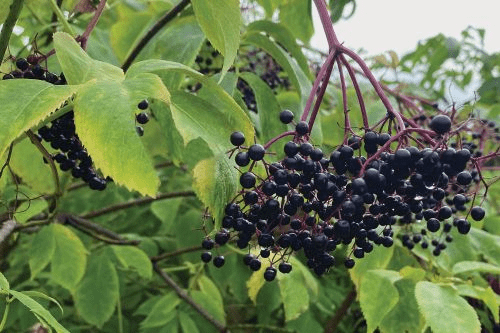In 2023, this life-saving medication was approved by the FDA for over-the-counter (OTC) use.
Naloxone (Narcan)
This plant, recently approved for recreational use in Ohio, has been used for thousands of years to help with anxiety, chronic pain, and stimulating appetite.
Cannabis
The typical time necessary for antidepressants to begin working.
2-6 weeks
The most common type of diabetes; usually occurs in adulthood.
Diabetes mellitus, type 2
This diet is high in sugars and fat, low in fiber, highly processed, and well known for increasing risk of chronic disease.
Western diet
In 1939, this fellowship, inspired by the work of Carl Jung, was started to help members seek a spiritual solution to their addiction.
Alcoholics Anonymous (AA)

Elderberry
These common over-the-counter pain relievers should be avoided while taking an SSRI due to the increased risk of stomach bleeding.
Non-steroidal anti-inflammatory drugs (NSAIDs)
This type of mood disorder is characterized by mostly manic episodes with or without periods of depression.
Bipolar disorder, type 1
This nutrient, commonly found in fruits and vegetables, helps improve blood glucose levels, lowers cholesterol counts, helps with constipation, feeds your gut bacteria, and helps you feel fuller longer.
Dietary fiber
This neurotransmitter is most responsible for getting someone to repeat a pleasurable activity, which may lead to a cycle of addiction.
Dopamine
This fragrant herb, with it's white daisy-like flowers, is helpful at treating hay fever, inflammation, muscle spasms, gastrointestinal issues, and insomnia.
Chamomile
This commonly prescribed antidepressant is commonly prescribed off-label for treating ADHD and substance abuse. It is also less likely to cause sexual dysfunction.
Wellbutrin (bupriopion)
This important skin routine should be performed while taking a mood stabilizer.
Using sunblock, covering your skin, or avoiding direct sun exposure.
Food desert
This is a condition in which a person takes a drug over time, and unpleasant physical symptoms occur if the drug is suddenly stopped or taken in smaller doses.
Physical dependence
Known for its beautiful purple flowers, this plant was often used by Native Americans to help treat cold/flu symptoms.
Echinacea
This condition can occur after quickly stopping an antidepressant.
Serotonin withdrawal or antidepressant discontinuation syndrome (ADS)
This mood stabilizer requires no routine blood work.
Lamictal (lamotrigine)
This diet, commonly found in Europe, Middle East, and Northern Africa, is characterized by lean meats and fish, olive oil, whole grains, fresh fruits and vegetables, and limited sweets.
Mediterranean diet
This commonly prescribed drug to treat opioid dependence is designed to slowly dissolve under the tongue, and it comes in either film or tablet form.
Suboxone
This minty herb may help with diarrhea and constipation associated with irritable bowel syndrome (IBS).
Peppermint
In 1988, this drug was released to the market to help treat Major Depressive Disorder.
Prozac (Fluoxetine)
This citrus fruit should be avoided while taking a mood stabilizer.
Grapefruit or grapefruit juice
This popular protein source is classified as a group 2a carcinogen, which means that is probably causes cancer.
Red meat (beef, pork, lamb)
This condition occurs when the body gets used to a medicine so that either more medicine is needed or different medicine is needed.
Tolerance

St. John's Wort
This potentially serious condition, characterized by headaches, tremors, and confusion, is caused by high levels of Serotonin.
Serotonin Syndrome
This type of mood disorder is characterized by shifts between hypomanic episodes and more frequent depressive periods.
Bipolar disorder, type 2
This diet, similar to the Mediterranean diet, emphasizes low fats and low sodium to help lower a person's blood pressure.
DASH (dietary approaches to stop hypertension) diet